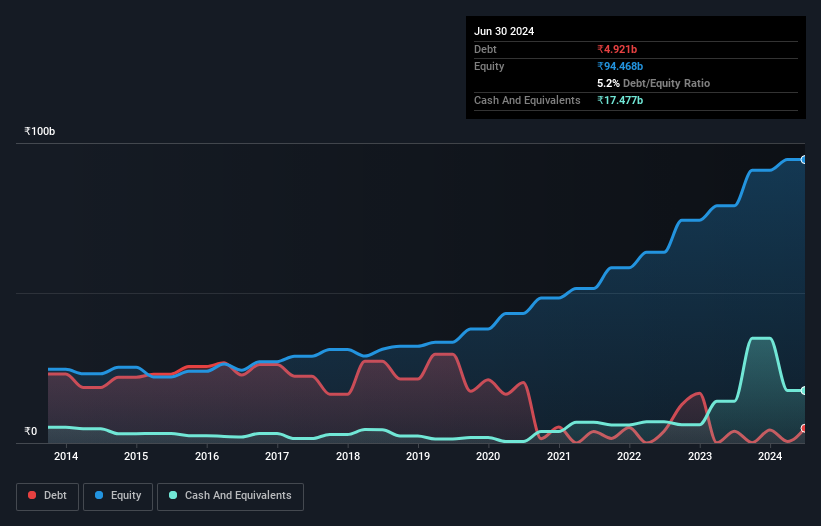Is Coromandel International (NSE:COROMANDEL) A Risky Investment?

Some say volatility, rather than debt, is the best way to think about risk as an investor, but Warren Buffett famously said that 'Volatility is far from synonymous with risk.' So it seems the smart money knows that debt - which is usually involved in bankruptcies - is a very important factor, when you assess how risky a company is. We note that Coromandel International Limited (NSE:COROMANDEL) does have debt on its balance sheet. But is this debt a concern to shareholders?
What Risk Does Debt Bring?
Debt is a tool to help businesses grow, but if a business is incapable of paying off its lenders, then it exists at their mercy. Ultimately, if the company can't fulfill its legal obligations to repay debt, shareholders could walk away with nothing. However, a more common (but still painful) scenario is that it has to raise new equity capital at a low price, thus permanently diluting shareholders. Having said that, the most common situation is where a company manages its debt reasonably well - and to its own advantage. When we think about a company's use of debt, we first look at cash and debt together.
Check out our latest analysis for Coromandel International
What Is Coromandel International's Debt?
As you can see below, at the end of March 2024, Coromandel International had ₹4.92b of debt, up from ₹3.93b a year ago. Click the image for more detail. However, its balance sheet shows it holds ₹17.5b in cash, so it actually has ₹12.6b net cash.

How Strong Is Coromandel International's Balance Sheet?
According to the last reported balance sheet, Coromandel International had liabilities of ₹58.6b due within 12 months, and liabilities of ₹5.41b due beyond 12 months. On the other hand, it had cash of ₹17.5b and ₹27.9b worth of receivables due within a year. So its liabilities total ₹18.7b more than the combination of its cash and short-term receivables.
Of course, Coromandel International has a market capitalization of ₹509.5b, so these liabilities are probably manageable. Having said that, it's clear that we should continue to monitor its balance sheet, lest it change for the worse. Despite its noteworthy liabilities, Coromandel International boasts net cash, so it's fair to say it does not have a heavy debt load!
In fact Coromandel International's saving grace is its low debt levels, because its EBIT has tanked 32% in the last twelve months. When it comes to paying off debt, falling earnings are no more useful than sugary sodas are for your health. The balance sheet is clearly the area to focus on when you are analysing debt. But it is future earnings, more than anything, that will determine Coromandel International's ability to maintain a healthy balance sheet going forward. So if you want to see what the professionals think, you might find this free report on analyst profit forecasts to be interesting.
But our final consideration is also important, because a company cannot pay debt with paper profits; it needs cold hard cash. Coromandel International may have net cash on the balance sheet, but it is still interesting to look at how well the business converts its earnings before interest and tax (EBIT) to free cash flow, because that will influence both its need for, and its capacity to manage debt. Looking at the most recent three years, Coromandel International recorded free cash flow of 43% of its EBIT, which is weaker than we'd expect. That's not great, when it comes to paying down debt.
Summing Up
We could understand if investors are concerned about Coromandel International's liabilities, but we can be reassured by the fact it has has net cash of ₹12.6b. So we are not troubled with Coromandel International's debt use. When analysing debt levels, the balance sheet is the obvious place to start. But ultimately, every company can contain risks that exist outside of the balance sheet. These risks can be hard to spot. Every company has them, and we've spotted 1 warning sign for Coromandel International you should know about.
At the end of the day, it's often better to focus on companies that are free from net debt. You can access our special list of such companies (all with a track record of profit growth). It's free.
New: AI Stock Screener & Alerts
Our new AI Stock Screener scans the market every day to uncover opportunities.
• Dividend Powerhouses (3%+ Yield)
• Undervalued Small Caps with Insider Buying
• High growth Tech and AI Companies
Or build your own from over 50 metrics.
Have feedback on this article? Concerned about the content? Get in touch with us directly. Alternatively, email editorial-team (at) simplywallst.com.
This article by Simply Wall St is general in nature. We provide commentary based on historical data and analyst forecasts only using an unbiased methodology and our articles are not intended to be financial advice. It does not constitute a recommendation to buy or sell any stock, and does not take account of your objectives, or your financial situation. We aim to bring you long-term focused analysis driven by fundamental data. Note that our analysis may not factor in the latest price-sensitive company announcements or qualitative material. Simply Wall St has no position in any stocks mentioned.
About NSEI:COROMANDEL
Coromandel International
Provides agriculture solutions in India and internationally.
Flawless balance sheet average dividend payer.


